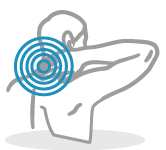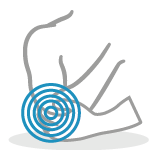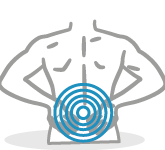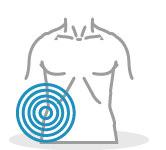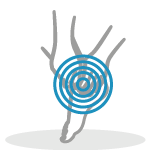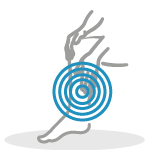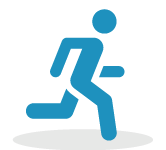Please read the following information and then use the links at the bottom of the page if you are looking for further information or exercise.
Jump to Exercises and Advice section
Important Facts About Your Ankle
Here is a list of the main problems and concerns we would recommend you get checked out by a health professional before starting self-management exercises. These are called ‘Red Flags’ and may indicate a more serious problem that requires medical assessment.
Symptoms that are present After Trauma
If your symptoms are caused by a recent traumatic incident (e.g. a fall, football tackle) and you have any of the following symptoms:
- Extensive bruising and/ or swelling
- Discolouration e.g. your foot looks pale, blue or red
- Severe pain and very limited movement
- Joint deformity eg foot looks like it is in the wrong place
- New lumps and bumps that appear after the trauma
- Great difficulty putting weight through your leg
- Numbness/ tingling into your foot after trauma
- Feeling of instability
Please Note: If you have a known diagnosis of osteoporosis (low bone density) a small amount of force may cause problems that require medical assessment.
Symptoms where No Trauma was Involved
- Sudden loss of active movement with or without pain
- Redness, heat and swelling of the joint/ surrounding area
- Increasing numbers of joints that are painful and/or stiff
- Fever or generally feeling unwell at same time as your foot pain developed
- Unexplained numbness/ tingling into your foot
- Constant pain which does not change with rest or activity
- Significant worsening pain at night
- Unexplained weight loss and/ or a previous history of cancer
- Unexplained lumps and bumps that appear or are changing/ growing
- Difficulty lifting the front part of your foot/ catching or dragging your foot when walking
Please Note: Special attention should be taken if you have a history of long-term steroid or immunosuppressive drug use, recent joint replacement, recent steroid injection, rheumatoid arthritis or other joint disease, recent infection, Intravenous drug use or alcohol misuse.
Our colleagues in the NHS Greater Glasgow and Clyde Podiatry team have developed a range of information resources for specific foot conditions – see what resources are available.
Foot and Ankle Exercises
Please make sure you have read through the important information about foot pain before proceeding.
Here are some beginner-to-progressive exercises to help you get your foot/ankle moving better. You may need to build these exercises up gradually.
You may be uncomfortable when you start doing these exercises – make sure the level of discomfort feels acceptable to you and that it doesn’t take too long to settle once you are finished.
The exercises should get easier the more consistently you manage to practice them and this may allow you to progress to more difficult exercises.
These are self help exercises:
- Try to enjoy the exercises and work at a pace and level that feels safe.
- Please use a common sense approach when deciding which ones to try.
- The exercises listed are not designed as an alternative to professional advice.
Ankle Sprain – Information and exercises ( leaflet and videos)
Warm Up (Video)
Calf Stretches (Video)
Calf Strengthening (Video)
Introduction (Video)
Heel Raises for Foot Pain (Video)
Foot Strengthening (Video)
Toe Walking (Video)
An MSK (musculoskeletal) physiotherapist can provide expert assessment and advice to help you manage pain, disability and injury to your joints, muscles or spine.
We do this through questioning and physical assessment.
We want to know what impact these problems are having on your life. Together we will discuss ways we can help aid your recovery and guide you to achieve your goals.
We can assist in helping you:
- understand and manage your MSK problem better
- improve your movement and strength
- maximise your function e.g. climbing stairs, returning to football
MSK Physiotherapy may not help if you:
- have longstanding aches and pains especially if these are widespread
- you have received no benefit from physiotherapy in the past
- you are attending the pain clinic for the same problem.
There are several ways you can access our service
- GP: You can ask your GP/Doctor to refer you if you and your GP are within Greater Glasgow and Clyde health board area.
- Hospital doctor/clinic: You may be referred to us through another NHS service e.g. orthopaedics.
- Yourself: If you live within the Greater Glasgow and Clyde area, you can refer yourself directly see links below.
We are unable to accept a self referral if
- You are not registered with a GP within NHS Greater Glasgow and Clyde.
- You are under 14 years old – please ask your GP to refer you to Children’s Services.
- You are currently pregnant – please self-refer to Maternity Physiotherapy, if you do not have the contact details in your maternity pack, please contact your midwife.
- You are currently attending or are under the care of Rheumatology – please self-refer to Rheumatology Physiotherapy by contacting the self-referral line on 0141 531 3703.
- You have attended Accident and Emergency or Minor Injuries Unit within the past 2 weeks for condition – we need a referral from your hospital clinic.
- Your condition is due to a fracture or break within the past 3 months – we need a referral from your hospital clinic to make sure physiotherapy is appropriate.
- You have had surgery for this condition within the past 3 months – we need a referral from your hospital clinic to make sure physiotherapy is appropriate.
- You require a home visit – please ask your GP to refer you to Community Rehab Services.
This What Happens Next leaflet explains what will happen once we receive your referral.
The Patient Information About Your Appointment With a Musculoskeletal Physiotherapist leaflet will give you more detail about what to consider and expect once an appointment has been arranged.
Self Referral Options
- On-Line Electronic Self Referral: You can refer yourself directly by filling in our Self Referral Form if you live within Greater Glasgow and Clyde. When you have submit your form you will receive a confirmation email with a PDF attachment of the information submitted. If you do not receive this please contact your local department to confirm we have received your referral. ** referrals submitted between Monday 1st and Tuesday 2nd of July 2024 may not have been received by our service. Please contact your local department or resubmit your referral**
Occupational Health Services
- NHS Staff: If you are a member of staff within NHSGGC and wish to refer to occupational physiotherapy, often waiting times are shorter. Please go to the Occupational Health webpage on HR Connect for further information.
- If you are Self Employed or work for a company with less than 250 employees you also have the option of Working Health Services Scotland (WHSS)
NHS Greater Glasgow and Clyde MSK out-patient physiotherapy
How can I help myself?
We know that many musculoskeletal (MSK) conditions benefit from good self-care and self-management. Use the icons below to link to information, videos and leaflets that you may find helpful. You can use this information independently or after receiving a diagnosis from a health professional. Please note that all the resources on this site are aimed at individuals aged 14 and over.
Self-care and self-management information
If you can’t find what you are looking for on this page you can also visit NHS inform for other resources.
Links to our MSK Physiotherapy Service
Website feedback
We want to make these pages as helpful as possible. Your feedback will really help us to improve the parts that matter most to you. The short, confidential questionnaire should take about 2 minutes to complete.
Physiotherapy- care feedback or complaints
We are always trying to improve and would value your feedback about the physiotherapy treatment you have received. This includes making a formal complaint.

